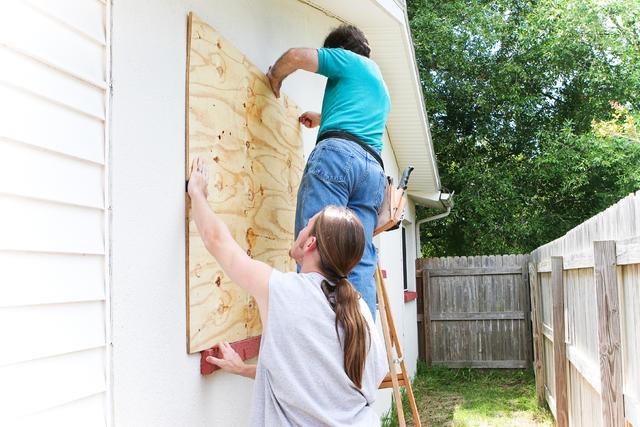
Safeguard Your Home this Hurricane Season
Don’t wait for a storm to hit, act now to protect your home!
Hurricane season can be a nerve-wracking time for homeowners, especially those living in vulnerable coastal areas. The threat of high winds, heavy rain, and flooding makes it crucial to prepare your home well in advance. By taking proactive measures, you can minimize damage and ensure the safety of your family. Here’s a comprehensive guide to getting your home ready for hurricane season.
Assess and Secure Your Home’s Exterior
Inspect Your Roof and Gutters
Your roof is your home’s first line of defense against a hurricane. Start by inspecting it for any signs of wear and tear. Look for missing or damaged shingles and repair them promptly. Clean out your gutters to ensure proper drainage and prevent water from backing up and causing damage. Regular maintenance can prevent small issues from turning into major problems during a storm.
Reinforce Windows and Doors
Windows and doors are vulnerable points during a hurricane. Install storm shutters or use plywood to cover windows and prevent shattering from flying debris. Ensure that doors, including garage doors, are sturdy and equipped with strong bolts or braces to withstand high winds. Consider installing impact-resistant glass if you live in a high-risk area.
Trim Trees and Shrubs
Trees and shrubs can cause significant damage if they fall or are blown against your home. Trim branches and remove any dead or dying trees that could pose a threat. This not only protects your property but also reduces the risk of power outages caused by falling trees. Regular landscaping maintenance is a key part of storm preparation.
Secure Outdoor Items
Outdoor furniture, grills, and other items can become dangerous projectiles in high winds. Secure these items by bringing them indoors or anchoring them to the ground. If you have a swimming pool, consider removing and storing pool accessories. Properly securing outdoor items can prevent damage to your home and your neighbors’ properties.
Prepare the Interior of Your Home
Secure Heavy Furniture and Appliances
High winds can turn heavy furniture and appliances into dangerous projectiles. Secure bookshelves, cabinets, and appliances to walls using brackets and straps. This precaution can prevent injuries and reduce damage during a storm. Don’t forget to secure water heaters and large electronics, which can cause significant damage if they fall over.
Protect Important Documents and Valuables
Store important documents, such as birth certificates, insurance policies, and property deeds, in a waterproof and fireproof safe. Consider digitizing these documents and storing copies in the cloud for easy access. Keep valuables in secure locations to prevent loss or damage. Having quick access to important documents can be crucial in an emergency.
Prepare an Emergency Kit
Assemble an emergency kit that includes essentials such as water, non-perishable food, medications, flashlights, batteries, a first-aid kit, and a battery-operated radio. Ensure you have enough supplies to last at least three days. Store the kit in an easily accessible location. Remember to include supplies for pets and any specific needs of family members.
Create a Family Emergency Plan
Develop a family emergency plan that outlines what to do in case of a hurricane. This plan should include evacuation routes, communication strategies, and a designated meeting place. Ensure all family members understand the plan and know how to execute it. Practice your emergency plan regularly to ensure everyone is prepared.
Ensure Adequate Insurance Coverage
Review Your Home Insurance Policy
Hurricane season is the perfect time to review your home insurance policy. Ensure that you have adequate coverage for wind, water, and flood damage. Standard homeowner’s insurance typically does not cover flood damage, so consider purchasing separate flood insurance if you’re in a high-risk area. Contact your insurance agent to discuss your policy and make necessary adjustments.
Document Your Belongings
Create an inventory of your belongings, including photos or videos, to help with insurance claims in case of damage. Documenting your possessions can speed up the claims process and ensure you receive fair compensation. Store this inventory in a safe place, such as a waterproof safe or a digital cloud storage service. Be aware of what your insurance policy does and does not cover. Some policies may have specific exclusions or limitations on coverage for hurricane-related damage. Understanding your policy’s limitations can help you plan better and avoid unpleasant surprises when filing a claim.
Plan for Evacuation
Know Your Evacuation Route
Familiarize yourself with local evacuation routes and have a plan in place for where you will go if you need to leave your home. Keep your vehicle fueled and ready to go and pack a “go-bag” with essentials such as clothes, toiletries, and important documents. Make sure all family members know the evacuation plan and route.
Stay Informed
Monitor local weather reports and follow the advice of authorities during hurricane season. Sign up for emergency alerts and stay informed about storm developments. Being aware and prepared can make all the difference in an emergency. Use reliable sources for weather updates and avoid spreading or acting on unverified information.
Communicate with Family and Neighbors
Ensure that you have a communication plan in place with your family and neighbors. Share your emergency plan and evacuation route with them. Having a support network can be invaluable during and after a hurricane. Check on elderly or vulnerable neighbors and help if needed.
Prepare Your Vehicle
Ensure your vehicle is in good working condition and has a full tank of gas. Keep an emergency kit in your car, including items like blankets, a flashlight, food, water, and a first-aid kit. In the event of an evacuation, having a well-prepared vehicle can make a significant difference.
Take These Steps Today to Protect Your Home!
Hurricane season doesn’t have to be a time of anxiety and fear. Preparing your home is an essential part of protecting your property. By taking these proactive steps, you can safeguard your property and ensure the safety of your family. From securing your home’s exterior and interior to ensuring adequate insurance coverage and having a solid evacuation plan, these steps can make a significant difference when a storm hits.
Don’t wait until the last minute—start your preparations today so you can be ready for whatever this hurricane season brings. Share your own preparation tips and experiences in the comments below to help others stay safe and prepared.



